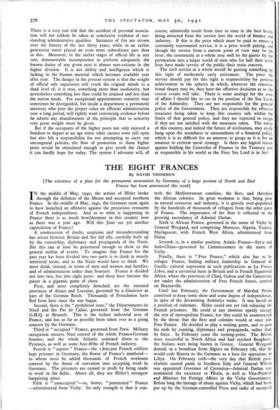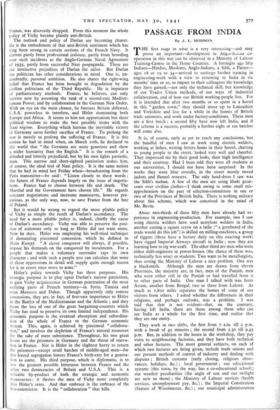THE EIGHT FRANCES
By DAVID THOMSON [The existence of a plan for the permanent annexation by Germany of a large portion of North and East France has been announced this week] IN the middle of May, 1940, the armies of Hitler broke through the defences of the Meuse and occupied northern France. In the middle of May, 1941, the Germans seem again to have launched an offensive against the precarious remnants of French independence. And as to what is happening in France there is as much bewilderment in this country now as there was a year ago. Will this June see yet another capitulation of France?
A smokescreen of doubt, suspicion and misunderstanding has arisen between Britain and her old ally, carefully built up by the censorship, diplomacy and propaganda of the Nazis. But this can at least be penetrated enough to show us the general outline of events. To imagine that France for the past year has been divided into two parts is to think in merely territorial terms, and as the Nazis would have us think. We must think, instead, in terms of men and women and families, and of administration rather than frontiers. France is divided not into two, but into eight parts: and these have become the pieces in a gigantic game of chess.
First, and most completely detached, are the annexed provinces of Alsace and Lorraine, governed by a Gauleiter as part of the German Reich. Thousands of Frenchmen have fled from here since the war began.
Second, there is the " prohibited zone," the Departements du Nord and the Pas de Calais, governed from the German G.H.Q. at Brussels. This is the richest industrial area of France, and has as far as possible been taken over as a going concern by the Germans.
Third is " occupied " France, governed from Paris. Military occupation ensures Nazi control of the whole Franco-German frontier, and the whole Atlantic seaboard down to the Pyrenees, as well as some four-fifths of French industry.
Fourth is " captive " France—the 1,800,000 French soldiers kept prisoner in Germany, the flower of France's manhood— to whom must be added thousands of French workmen coerced by the threat of starvation into accepting work in Germany. The prisoners are turned to profit by being made to work in the fields. Above all, they are Hitler's strongest bargaining piece.
Fifth is " unoccupied "—or, better, " penetrated " France —administered from Vichy. Its only strength is that it con- trols the Mediterranean coastline, the fleet, and therefore the African colonies. Its great weakness is that, being poor in natural resources and industry, it is grossly over-populated by the hundreds of thousands of refugees from the other parts of France. The importance of the fleet is reflected in the growing ascendancy of Admiral Darlan.
Sixth is African France, governed in the name of Vichy by General Weygand, and comprising Morocco, Algeria, Tunisia, Madagascar, with French West Africa, administered from Dakar.
Seventh is, in a similar position, Asiatic France—Syria and Indo-China—governed by Commissioners in the name of Vichy.
Finally, there is " Free France," which also has to be refugee France, finding military leadership in General de Gaulle, cultural expression in such publications as La France Libre, and a territorial basis in Britain and in French Equatorial Africa, where the provinces of Chad, Gabun and the Cameroons are under the administration of Free French forces, centred on Brazzaville.
Until last February, the Government of Marshal Petain contrived to keep some show and some degree of independence, in spite of the devastating Armistice terms. It was based on a position of stalemate. Hitler could not yet risk releasing the French prisoners. He could at any moment openly occupy the rest of metropolitan France, but this could be counteracted by the threat that the fleet and colonies would at once join Free France. He decided to play a waiting game, and to gain his ends by cunning, diplomacy and propaganda, rather than by force. In February came the turning-point. The British were successful in North Africa and had reached Benghazi ; the Italians were being beaten in Greece. General Weygand denied, in a broadcast from Algiers on February 7th, that he would cede Bizerta to the Germans as a base for operations in Libya. On February oth—the very day that British para- chutists caused panic in Southern Italy and General Wilson was appointed Governor of Cyrenaica—Admiral Darlan was nominated the successor to Petain, as well as Vice-Premier and Minister for Foreign Affairs in the Vichy Government. Before long the barrage of abuse against Vichy, which had been put up by the German-controlled Press and radio of occupied France, was discreetly dropped. From this moment the whole policy of Vichy became plainly anti-British.
The outlook and policy of Darlan are becoming clearer. He is the embodiment of that anti-British sentiment which has long been strong in certain sections of the French Navy. It derives partly from professional jealousy, partly from brooding over such incidents as the Anglo-German Naval Agreement of 1935, partly from successful Nazi propaganda. These are the instinctive prejudices of Darlan the sailor. But Darlan the politician has other considerations in mind. One is, un- doubtedly, personal ambition. He also shares the right-wing belief that France has been brought to degradation by the civilian politicians of the Third Republic. He is impatient of parliamentary methods. France, he believes, can only survive now by assuming the" rank of a second-rate Mediter- ranean Power, and by collaboration in the German New Order. With an eye on the main chance, he foresees Britain defeated, U.S.A. powerless tt interfere, and Hitler dominating both Europe and Africa. It seems to him not opportunism but sheer political wisdom to make the best possible terms with the Nazi regime, Everything which hastens the inevitable victory of Germany, saves further sacrifice of France. To prolong the war is merely to prolong the suffering of France. It is this notion he had in mind when, on March r oth, he declared to the world that " the Germans are more generous and show a wider humanity than the English." It is the remark of a deluded and bitterly prejudiced, but by his own lights patriotic, man. This narrow and short-sighted patriotism makes him, of course, the ideal tool of Nazi policy. It is the same notion that he had in mind last Friday when—broadcasting from the Paris transmitter—he said: " Listen closely to these words ; the future of France depends largely on the issue of negotia- tions. France had to choose between life and death. The Marshal and the Government have chosen life." He regards constant negotiations and incessant manoeuvre, however pre- carious, as the only way, now, to save France from the fate of Poland.
But it would be wrong to regard the more pliable policy of Vichy as simply the result of Darlan's ascendancy. The need for a more pliable policy is, indeed, chiefly the cause of Darlan's ascendancy. Vichy was able to preserve the posi- tion of stalemate only so long as Hitler did not want more. Now he does. Hitler was employing his well-tried technique of demanding piecemeal concession, which he defined in Mein Kempf. " A clever conqueror will always, if possible, impose his demands on the conquered by instalments. For a people that makes a voluntary surrender saps its own character ; and with such a people you can calculate that none of these oppressions in detail will supply quite enough reason for it to resort once more to arms."
Hitler's policy towards Vichy has three purposes. His 'strategic purpose is to play upon Darlan's narrow patriotism, to gain. Vichy acquiescence in German penetration of the most outlying parts of French territory—in Syria, Tunisia and even Morocco. and Dakar. Though apparently only remote concessions, they are, in fact, of first-rate importance to Hitler in the Battles of the Mediterranean and the Atlantic ; and they mean the loss of one of the great bargaining-counters which Vichy has used to preserve its own limited independence. His economic purpose is the eventual absorption and subordina- tion of the whole of France to the German economic system. This, again, is achieved by piecemeal " collabora- tion," and involves the depletion of France's natural resources for the sake of mere subsistence. Throughout, his two great levers are the prisoners in Germany and the threat of starva- tion in France. Nor is Hitler in the slightest hurry to return the prisoners—except small batches of middle-aged men—for this forced segregation lowers France's birth-rate for a genera- tion to come. His third purpose, which is diplomatic, is to sow the greatest possible bitterness between France and the other two democracies of Britain and U.S.A. This is a valuable by-product of both the strategic and economic manoeuvres: it throws the men of Vichy more completely into Hitler's arms. And that embrace is the embrace of the boa-constrictor. It is the " collaboration " that kills.































 Previous page
Previous page